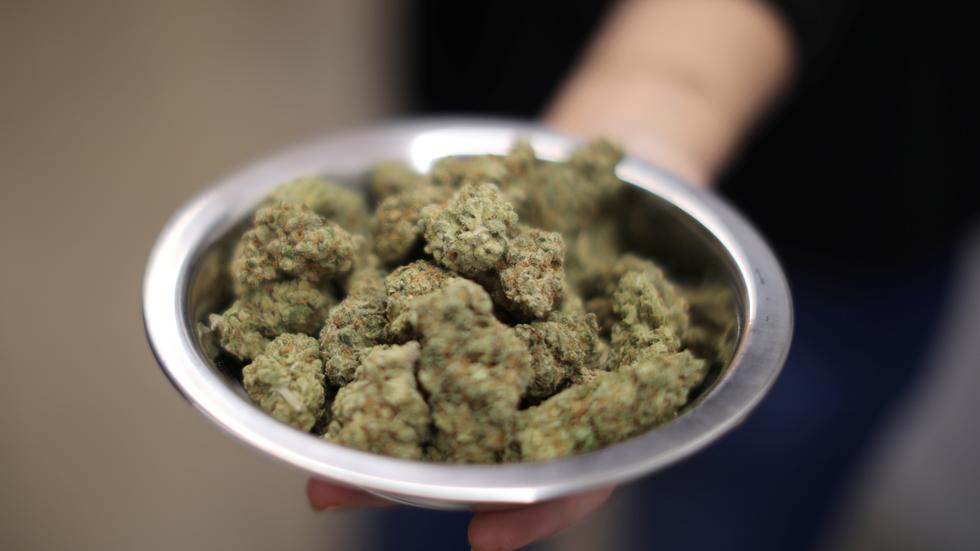(单词翻译:单击)
听力文本
HARI SREENIVASAN: On New Year's Day, California joined the growing list of states and the District of Columbia where it is now legal to sell marijuana. While state and local leaders may see marijuana as a taxable cash crop, the Trump administration has a different point of view. On Thursday, Attorney General Jeff Sessions rescinded an Obama administration policy that discouraged federal prosecutors in most instances from bringing charges in places where marijuana is legal under state law. Joining me now from Washington, D.C., is John Hudak, the deputy director of the Center for Effective Public Management at the Brookings Institution, to help assess the impact of this move.
So let's just, in plain English, what does the attorney general calling for?
JOHN HUDAK: What the attorney general is calling for is the freeing up for U.S. attorneys, for federal prosecutors to start to go after state legal marijuana businesses who are complying with state law and are serving customers in states that have chosen to reform their marijuana laws. Something that the Obama administration put protections in against, the Trump administration is repealing that.
HARI SREENIVASAN: And this was something the Attorney General Sessions said that he wasn't really going to take action on during his confirmation hearing, right?
JOHN HUDAK: The attorney general has had a lot of mixed language when it comes to this issue. He's been cagey. There have been moments where he has suggested that he saw the standing policy as a good one, or one to keep in place, and there are other moments where you hear the attorney general using that type of “War on Drugs” language about marijuana that we really haven't heard from the top tiers of administrations for, for 15 or 20 years.
HARI SREENIVASAN: But what happens? There are small businesses that are taking steps already in states where it is legal, and there are investors, there's possible bank loans, all sorts of institutions that are involved in this economy. What happens when this statement from on high comes in? Does it add some uncertainty into how these businesses fare?
JOHN HUDAK: Well certainly the statement itself, the policy change itself, adds uncertainty to this industry and of course uncertainty is bad for any business. But the statement itself won't necessarily enact change. Change will happen when U.S. attorneys, working closely with DEA and other law enforcement entities begin enforcing against these businesses. That day may never come, but if it does, that will be a moment where the industry feels the real effects of this policy. And you'll start to see ripple effects spreading out from there.
HARI SREENIVASAN: There's already been pushback from Senator Gardner in Colorado and, how does states respond to this? What can they do to encourage what they might see as an important part of their economy?
JOHN HUDAK: Well you're right about Senator Gardner. In fact dozens and dozens of House members and senators have come out and slammed the attorney general for this policy, in part because it actually goes back on what were statements by the president when he was running for office about his view on this issue. He said that it should be a states rights issue.
So what do states have to do? What can they do? First off, they don't have to help the federal government enforce federal law. There is a protection against that under the 10th Amendment to the Constitution. And so you will see a lot of states, most states probably, just say to the federal government, if you want to enforce your laws go ahead and do it on your own. You're not getting a dime of state revenue to help do this and that really is the first line of protection that states have.
HARI SREENIVASAN: But what about if the DEA wants to come in to a growing operation in California or Colorado and carry out what they say, “This is my job, I'm doing this, what the federal law says, right?”

JOHN HUDAK: There's really nothing states can do. If DEA goes into a state with recreational marijuana and begins to arrest people, shut down businesses, seize assets, seize plants. There's not much the state can do to combat that. It is illegal under federal law. DEA and U.S. attorneys have the authority to investigate and bring charges against these entities and it would be a difficult day for the marijuana industry. It would be a day that may frustrate governors across the country but it's a day that would be completely in compliance with federal law.
HARI SREENIVASAN: All right John Hudak of the Brookings Institution, thanks so much.
JOHN HUDAK: Thank you.
重点解析
1.bring charges 提起诉讼
He campaigned relentlessly to bring charges of corruption against former members of the government.
为了将前政府成员以贪污腐败的罪名送上法庭,他持续不懈地奔走游说。
2.free up 解放/使自由
This means we can free up reporters so they have more time to think.
这意味着我们可以将记者从撰写新闻的工作中解放出来,让他们有更多时间思索。
3.go after 追随/追击
We're not going after civilian targets.
我们不会以民用设施为打击目标。
4.push back 击退/反对
Through you we push back our enemies; through your name we trample our foes.
我们靠你要推倒我们的敌人。靠你的名要践踏那起来攻击我们的人。
参考译文
哈里·斯瑞尼瓦桑:元旦当天,支持娱乐性大麻合法化的州数增加,加利福尼亚州也加入其中,哥伦比亚特区现也同意在其州内合法销售大麻。尽管州政府及地方政府可能将大麻视为应税经济作物,但特朗普政府却持不同观点。周四,司法部长杰夫·赛辛斯撤销了奥巴马政令,即不鼓励联邦检察官在州法律允许的范围内,指控大麻使用。现请华盛顿特区布鲁金斯学会高效公共管理中心副主任约翰·豪达,就此举所产生的影响,为您进行解析。
那么,简单来讲,司法部长想干什么?
约翰·豪达:司法部长想要还美国律师及联邦检察官们以自由,让他们盯紧,那些大麻商们,尽管他们得到了州政府赋予他们的合法经营自由。这些大麻商们遵守州法,(没有遵守联邦法律,)服务州民,而这些州民恰是推动大麻立法改革的始作俑者。当年奥巴马政府已对这些内容实施了保护性措施,而特朗普政府正将它们一一废除。
哈里·斯瑞尼瓦桑:司法部长赛辛斯说,他不会在听证会上采取行动,对吗?
约翰·豪达:在这个问题上,司法部长前后口径不一,总是吞吞吐吐。有些时候,他表示看好这一长期政策,或者说这一稳定政策,也有时候,他嘴里也会冒出“大麻战争”这种词,而“大麻”这个词,在过去15年或20年里,我们未曾听到任何一个高层国家领导人有过任何提及。
哈里·斯瑞尼瓦桑:但到底了发生什么?在那些合法的州里,一些小的大麻企业正在采取措施,有人在投资,有人在从银行贷款,大家全都参与到这个大麻经济里来了。那么,当我们听到来自高层的声音时,会怎样?这是否会增加相关经济的不确定性呢?
约翰·豪达:当然,声明本身,政策本身的变化,会增加这个行业的不确定性,并且肯定,不确定性于任何行业而言都是不利的。但声明本身并不一定会激起变动。而只有当那些与DEA及其他执法机关密切合作的美国律师开始发难这些企业时,变化才会产生。这一天可能永远不会到来,但如果真的发生了,那也将是大麻商们真正感受到这一政策力量的时刻。连锁反应就此展开。
哈里·斯瑞尼瓦桑:已有科罗拉多州参议员加德纳提出反对意见,政府又如何回应呢?要想助力大麻经济,他们能做些什么呢?
约翰·豪达:嗯,对于加德纳参议员,你看得对。事实上,已有数十位两院议员站出来,抨击司法部长这一政策了。一部分是因为这实际上,关系到总统竞选时对此方面的承诺。他说这涉及到各州的立法执法权问题。
那么各州要怎么做呢?他们能做什么呢?首先,他们无需帮联邦政府执行联邦法律。宪法第十修正案中有一项提及了对这种情况的保护。所以你会看到很多州,或者可能大多数州,会对联邦政府说,如果你想执法,自己去好了。协助执法,各州又没拿到政府财政收入的一分钱,凭什么帮它们做这事,而这的确是保护各州的第一道防线。
哈里·斯瑞尼瓦桑:但是,如果DEA想要拿加利福尼亚州或科罗拉多州开刀,并执行他们所说的,“这是我的职责所在,我正在做联邦法律让我做得事,对吗?”
约翰·豪达:要是DEA进入一个娱乐大麻合法化州,逮捕州民,关闭企业,没收资产,叫停工厂,各州还真无能为力。各州基本没有对策。根据联邦法律,使用娱乐性大麻是违法的。DEA和美国律师有权调查并起诉这些人和厂家。这对于大麻行业而言,将是艰难时世。或许全国州长都会为之感到沮丧,但这却完全符合联邦法律。
哈里·斯瑞尼瓦桑:好的,布鲁金斯学会约翰·豪达,谢谢你。
约翰·豪达:谢谢你。
译文为可可英语翻译,未经授权请勿转载!


